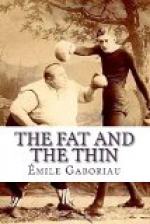Nothing was said at the Quenu-Gradelles’ about all the rumours which circulated. There was a tacit understanding amongst the staff of the pork shop to keep silent respecting them in the presence of Quenu. The latter, somewhat saddened by the falling-out between his brother and his wife, sought consolation in stringing his sausages and salting his pork. Sometimes he would come and stand on his door-step, with his red face glowing brightly above his white apron, which his increasing corpulence stretched quite taut, and never did he suspect all the gossip which his appearance set on foot in the markets. Some of the women pitied him, and thought that he was losing flesh, though he was, indeed, stouter than ever; while others, on the contrary, reproached him for not having grown thin with shame at having such a brother as Florent. He, however, like one of those betrayed husbands who are always the last to know what has befallen them, continued in happy ignorance, displaying a light-heartedness which was quite affecting. He would stop some neighbour’s wife on the footway to ask her if she found his brawn or truffled boar’s head to her liking, and she would at once assume a sympathetic expression, and speak in a condoling way, as though all the pork on his premises had got jaundice.
“What do they all mean by looking at me with such a funereal air?” he asked Lisa one day. “Do you think I’m looking ill?”
Lisa, well aware that he was terribly afraid of illness, and groaned and made a dreadful disturbance if he suffered the slightest ailment, reassured him on this point, telling him that he was as blooming as a rose. The fine pork shop, however, was becoming gloomy; the mirrors seemed to pale, the marbles grew frigidly white, and the cooked meats on the counter stagnated in yellow fat or lakes of cloudy jelly. One day, even, Claude came into the shop to tell his aunt that the display in the window looked quite “in the dumps.” This was really the truth. The Strasburg tongues on their beds of blue paper-shavings had a melancholy whiteness of hue, like the tongues of invalids; and the whilom chubby hams seemed to be wasting away beneath their mournful green top-knots. Inside the shop, too, when customers asked for a black-pudding or ten sous’ worth of bacon, or half a pound of lard, they spoke in subdued, sorrowful voices, as though they were in the bed-chamber of a dying man.




